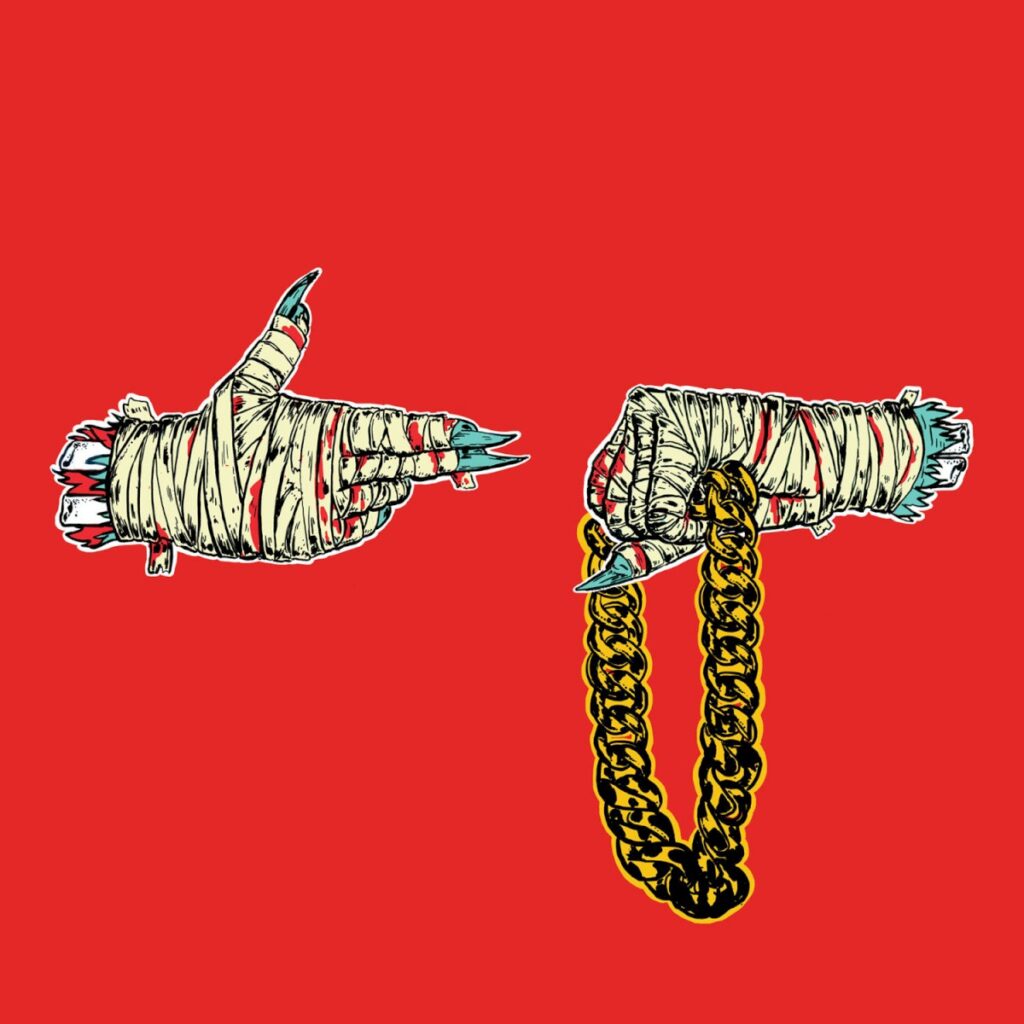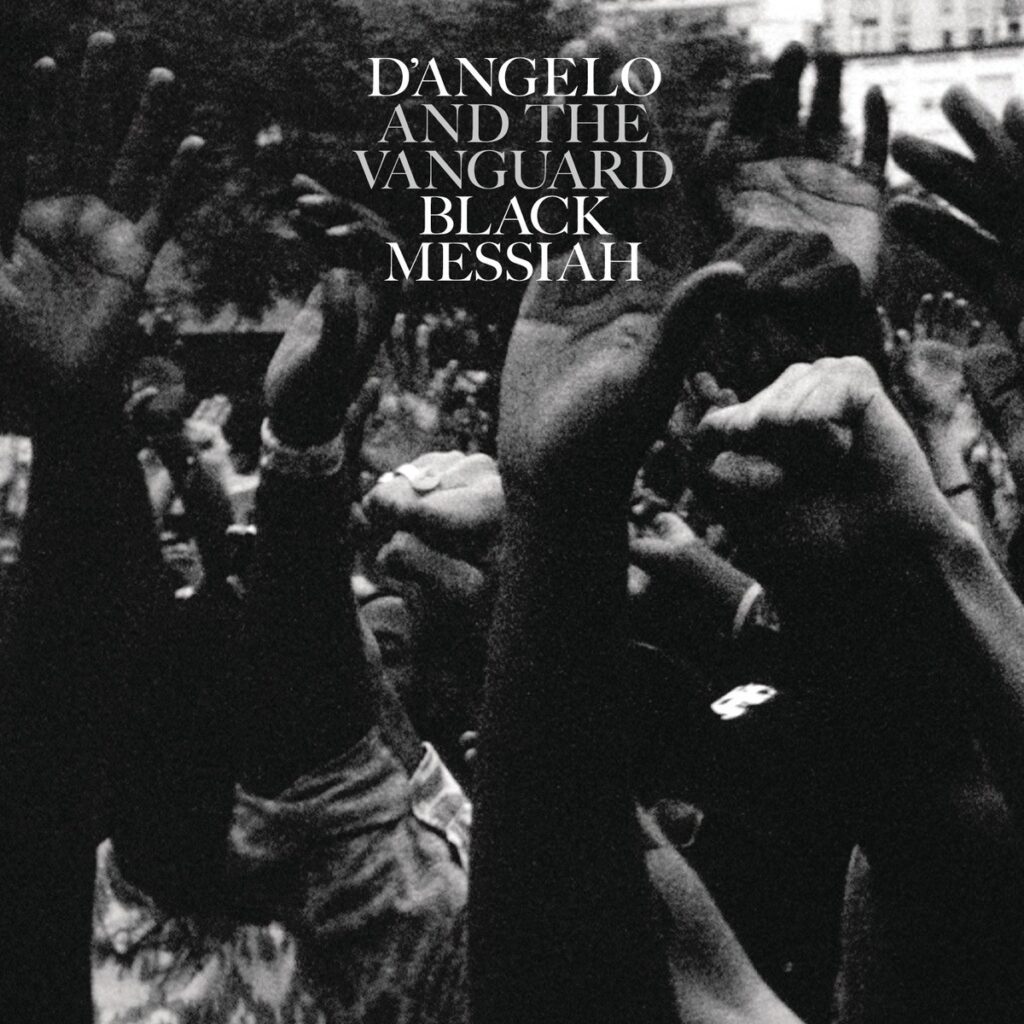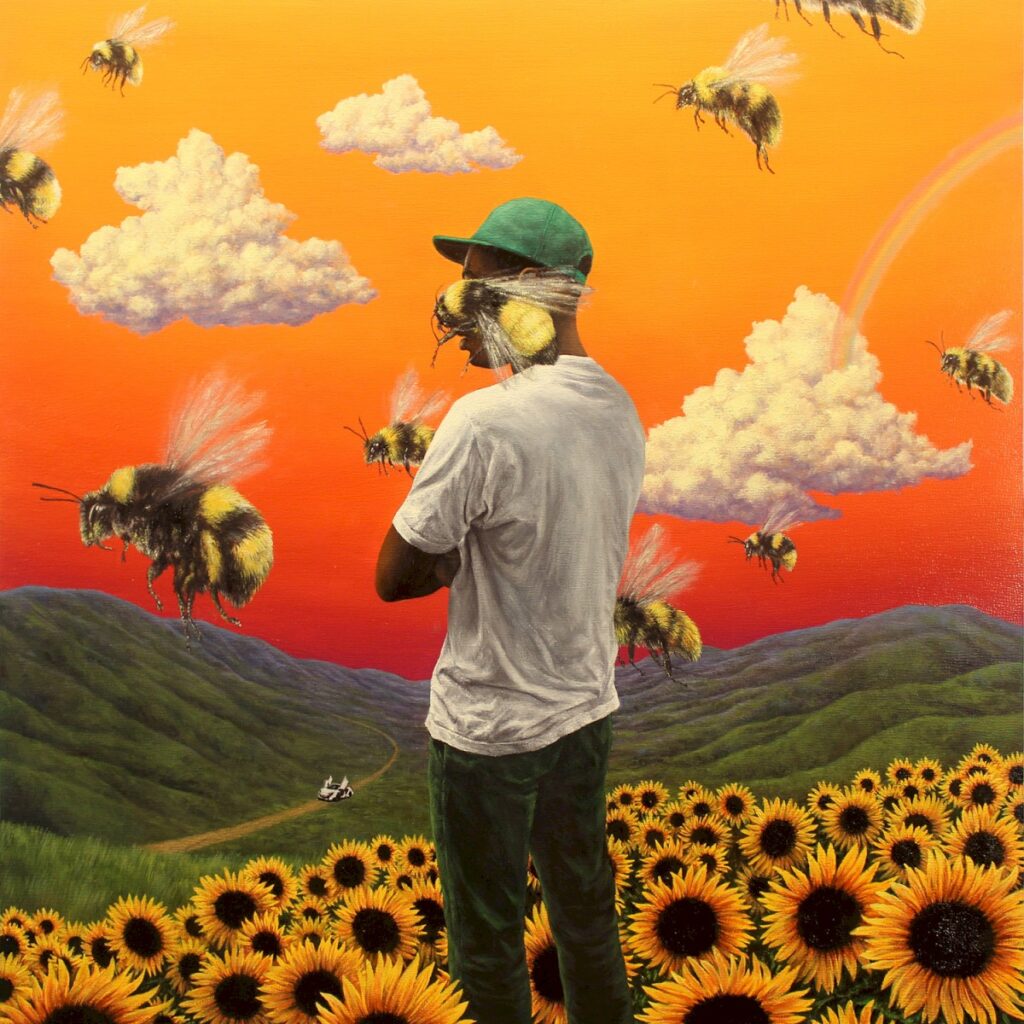65.
Run The Jewels, ‘Run The Jewels 2,’ 2014

Run the Jewels’ sophomore effort, Run The Jewels 2, marks a significant leap in artistic depth and cohesiveness compared to their debut. Thematically, Run The Jewels 2 does not shy away from tackling heavy issues. Social commentary is interwoven throughout the tracks, scrutinizing aspects of the modern world from governmental corruption to police brutality. The album engages with themes of systemic oppression, economic disparity, and the struggles of marginalized communities. For instance, Early poignantly explores a disturbing family encounter with overzealous police officers, providing a stark reflection on racial injustice. Moreover, the underlying narrative suggests a movement, a rallying cry for unity and defiance against the established order. The line “You are not you, you are now us” from Crown encapsulates this sentiment, inviting listeners to share in the duo’s militant fervor and collective identity. This element of camaraderie is critical in grounding their complex, socially charged rhetoric. Killer Mike and El-P maintain a consistent balance between introspective musings and scathing critiques. The album’s hooks and verses are peppered with biting humor and vivid imagery, further enriching the listener’s experience. Songs like Lie, Cheat, Steal feature adept shifts in tone, moving from the slightly evil to the insanely unhinged with seamless fluidity. In Jeopardy, Killer Mike’s technical proficiency shines as he unpacks layers of societal critique with menacing precision. El-P’s production on Run The Jewels 2 is nothing short of revelatory. Known for his apocalyptic soundscapes, El-P takes his craft to new heights by weaving together eerily outlandish beats with deep, resounding basslines and sharp, percussive elements. This sophomore project is significantly more layered and refined compared to its predecessor. The production feels like a living, breathing organism, each track pulsating with kinetic energy and unexpected twists. For instance, Oh My Darling Don’t Cry integrates vocal snippets from Police Academy’s Michael Winslow, adding a playful, yet sinister edge to the beat. The instrumental on Jeopardy starts with a slow-burning bass synth that escalates into an all-consuming force, showcasing El-P’s meticulous attention to sonic details.
64.
D’Angelo & the Vanguard, ‘Black Messiah,’ 2014

Released in a shock move after a fourteen-year hiatus, D’Angelo’s Black Messiah hit the music scene in December 2014, marking the soul musician’s first album of new material since Voodoo in 2000. Black Messiah was born out of a context of societal upheaval and profound personal introspection. D’Angelo himself reveals that the title might mislead listeners into thinking it pertains directly to religion. Instead, the term Black Messiah symbolizes a collective uprising against oppression. In his liner notes, D’Angelo elucidates that the album’s title is inspired by people standing up against injustice, as seen in movements like Ferguson, Occupy Wall Street, and protests in Egypt. He challenges everyone to strive to be a Black Messiah, advocating for communal leadership and social justice. The lyrical content of Black Messiah is both personal and political, intertwining themes of love, betrayal, societal issues, and introspection. The album’s most overtly political track, The Charade, addresses systemic racial injustice with lines like, “All we wanted was a chance to talk/’Stead we only got outlined in chalk.” Meanwhile, Till It’s Done (Tutu) raises environmental and societal concerns with its questioning: “Carbon pollution is heating up the air… Sons and Fathers die/ Soldiers, daughters killed/ Question ain’t do we have resources to rebuild/ Do we have the will?” On the personal front, Really Love, a soulful ballad, sees D’Angelo crooning in his characteristic falsetto about an intense romantic longing, adding depth with Spanish guitar and lush strings. Musically, Black Messiah is a rich tapestry of genres and influences, pulling together elements of soul, funk, jazz, rock, and hip-hop. The album’s deliberate avoidance of contemporary pop and R&B trends, opting instead for an analog, murky funk sound, reminiscent of Sly and the Family Stone’s 1971 album There’s a Riot Goin’ On. The album traverses through different eras and sounds while maintaining a cohesive identity that is distinctly D’Angelo’s. Tracks such as 1000 Deaths and Ain’t That Easy exemplify this controlled chaos, where heavy guitar riffs and distorted, gritty vocals create a raw, almost menacing atmosphere. These compositions echo the work of Funkadelic and The Revolution, infused with D’Angelo’s unique experimental touch.
63.
Waxahatchee, ‘Cerulean Salt,’ 2013

Waxahatchee’s sophomore album, Cerulean Salt, is fundamentally an album of contrasts, encapsulating both confidence and vulnerability. The record expands on the starkly poignant anecdotes and introspective themes that were first introduced in the band’s debut, American Weekend. With elements such as self-deprecating anxieties and quarter-life ennui, it touches upon relatable yet deeply personal experiences. Katie Crutchfield has mentioned in interviews that sad songs resonate more authentically with her, admitting that venturing into other emotional territories often felt insincere. This sense of honesty permeates the entire album, offering a sense of genuine emotional gravitas. The album is thematically rich, with recurring motifs of loneliness, self-doubt, and existential introspection. Crutchfield’s songwriting is characterized by its emotional directness and relatability. Swan Dive is a remarkable track that embodies the album’s emotional core. Crutchfield sings “We will find a way to be lonely any chance we get,” a line that addresses the inevitable solitude that permeates human interactions and relationships. Likewise, Brother Bryan touches on youthful disillusionment: “Our parents go to bed early / We destroy all of our esteem.” In You’re Damaged, the lines “We’ll cut our hands agape and manifest / Compassion we’ll lose with time and test” offer a bleak yet poignant commentary on the pressures and eventual shortcomings in relationships. Moving from the acoustic simplicity of American Weekend, Cerulean Salt incorporates a fuller, more robust sound palette. The switch from lo-fi to a more polished sound brings clarity to Crutchfield’s intricate compositions without sacrificing their emotional immediacy. While Crutchfield wrote and sang all the songs, she was backed by the three-piece band Swearin’, consisting of Kyle Gilbride, Keith Spencer, and her twin sister Allison. This collaboration brought a heightened sense of dynamism and polished the rough edges of her previous work. The album’s composition varies from soft, introspective pieces to songs with more aggressive, distorted guitar work. Coast to Coast is a prime example of this, blending the raw energy of indie punk with melodic pop sensibilities. Likewise, Blue Part Two and Tangled Envy showcase Waxahatchee’s ability to captivate with minimal instrumentation, relying on subtle chord progressions and emotive vocal delivery.
Could you be extraordinary?
We’re alone in this gaudy mess
In the house of slurred speech
Sharing gravity to suppress
And in your ear I will whisper weakly
Things that I do not mean
You are deaf and dumb and I am numb
And we’re illuminating
62.
Tyler, the Creator, ‘Flower Boy,’ 2017

Tyler, The Creator’s fourth studio album, Flower Boy, marks a seminal moment in his career, exploring a broad range of themes, including depression, loneliness, sexuality, love, friendship, materialism, and fame. Tyler navigates these profound topics through an elaborate narrative that mirrors his journey of self-discovery. Integrating car ride and botanical motifs, he metaphorically addresses his growth and struggles. The album’s car motif symbolizes Tyler’s life journey, where driving represents his escape from fears and contemplation of his past, present, and future. The parallel flower and garden motifs signify his personal growth and self-realization, often tied to his exploration of his sexuality. The introspective nature of the album is first hinted at in the opening track Foreword, where Tyler questions his existence and purpose in a materialistic world. This thematic depth continues throughout the album, diverging from his earlier, more anarchic works like Goblin, Wolf, and Cherry Bomb. Flower Boy presents some of Tyler’s most honest and poignant lyrics to date. Expressing feelings of isolation, self-doubt, and coming to terms with his sexuality, Tyler’s lyrical prowess shines through each song’s narrative. In Garden Shed, he implicitly reveals his struggles with sexuality: “Garden shed, garden shed, garden shed / For the garçons / Them feelings I was guarding, heavy on my mind / All my friends lost / They couldn’t read the signs.” This subtle yet powerful admission resonated with fans and critics alike, bringing a humanizing facet to his otherwise eccentric persona. The composition is another strong suit of the album, blending genres ranging from hip-hop to neo-soul, jazz, and alternative rap. Tyler, The Creator took the helm as the sole producer of Flower Boy, and his production combines glowing orchestrations, unpredictable chord progressions, and sweet vocal harmonies, creating a soundscape that is both unique and entrancing. Tracks like See You Again featuring Kali Uchis showcase lush, melodic arrangements complemented by Tyler’s vocally layered delivery. The production of Boredom integrates smooth, languid beats that align perfectly with the theme of existential ennui.
61.
Kanye West, ‘Yeezus,’ 2013

With its audacious and minimalist sonic palette, Yeezus diverged dramatically from the lush and grandiose production found in West’s previous works, signaling a bold shift in his artistic trajectory. Yeezus is steeped in themes of race, power, consumerism, and self-deification. Kanye West, never one to shy away from grand statements, explicitly compares himself to Jesus – a move reflected in the album’s title. The record oscillates between blistering social commentary and introspective self-examination, creating a layered and often contradictory narrative. Tracks like New Slaves directly address systemic racism and the prison-industrial complex, critiquing wealthy private prison owners and their allies. Meanwhile, I Am a God encapsulates Kanye’s ego and his perceived divinity, juxtaposed with mundane demands like asking for croissants. Indeed, Yeezus is rife with dichotomies. On New Slaves, Kanye lambasts consumer culture and societal oppression, only to revel in material excess and hedonism later on tracks like Send It Up. This duality, while confusing to some, is a testimony to Kanye’s ability to embody contradictions and use them to fuel his art. Lyrically, Yeezus is provocative, confrontational, and, at times, crude. The lines are filled with abrasive imagery and unapologetic vulgarity. Tracks like Black Skinhead and New Slaves serve as the album’s socio-political anchors, with Kanye addressing themes of racial prejudice and systemic inequality with raw intensity and fury. His delivery is often more aggressive and raw, employing a tone that oscillates between rap and a primal scream, most notably on Black Skinhead. The production on Yeezus is perhaps its most defining characteristic. Abandoning the lush orchestration and soulful samples that characterized his earlier albums, Kanye, with the help of executive producer Rick Rubin, opted for a minimalist, industrial sound. This approach is evident from the opening track On Sight, which features a synth-heavy, distortion-laden beat that immediately sets the album’s confrontational tone. The album draws from a wide array of musical influences including industrial, acid house, electro, punk, and Chicago drill. Significant contributors to this eclectic mix include Daft Punk (Black Skinhead and I Am a God), and Arca, whose avant-garde electronic touch can be felt throughout the album. The stripped-down production style leaves space for every sound to shine, creating a sense of raw, unfiltered intensity.